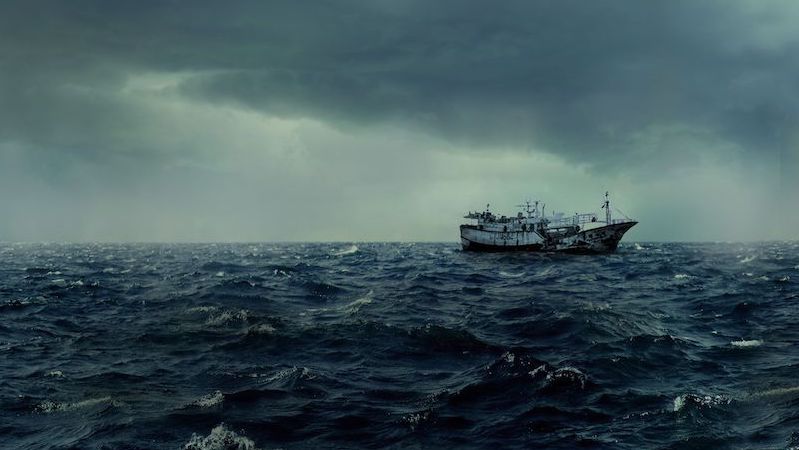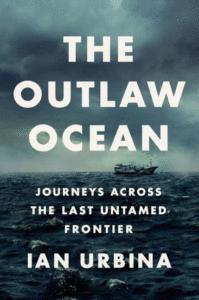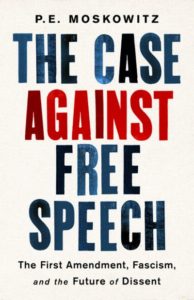
Our five favorite reviews of the week include Blair Braverman on Ian Urbina’s deep dive into the last untamed frontier, Walter Kirn on Anthony McCann’s chronicle of the Oregon standoff, Laura Collins-Hughes on Rion Amilcar Scott’s stories of magical realism and American racism, Jacob Bacharach on P. E. Moskowitz’s case against free speech, and Nathan Deuel on Kimberly King Parsons’ punk rock short story collection.

“These chapters are vibrant as individual stories, but as a collection they’re transcendent, rendering a complex portrait of an unseen and disturbing world. Urbina pursues a depth of reportage that’s rare because of the guts and diligence it requires … The result is not just a fascinating read, but a truly important document. It is also a master class in journalism. As he enters these worlds, Urbina provides glimpses into his methods, his fears and misconceptions … For all it exposes, The Outlaw Ocean doesn’t offer the comfort of a call to action. No buy-this-instead-of-that seafood guides; no illusion of consumer choices as an answer. Instead, we are left with the discomfort of complicity. There is no clear solution to the ocean’s problems because our entire world—our economic system, our geography—is the cause. I’d always assumed the greatest threat to the ocean was the greed of the rich, but in fact it’s the desperation of the poor, which is, of course, the flip side of the same coin. As long as there is desperation, there will be exploitation. And people, good and bad, will always be able to use the ocean to disappear.”
-Blair Braverman on Ian Urbina’s The Outlaw Ocean: Journeys Across the Last Untamed Frontier (The New York Times Book Review)
“Halfway through Rion Amilcar Scott’s The World Doesn’t Require You, a rich and extraordinary new collection rooted in an African-American present reverberant with the past, the reader has long since signed on to take its wild ride, traversing a landscape where myth meets magic realism. … Scott, whose 2016 debut collection, Insurrections, introduced readers to Cross River, has created a fictional mini-world so detailed that, for all its surreality, you begin to feel you could draw it on a map. But what he’s also tracing here is a history of oppression—and not just in the slavery that Cross River’s 19th-century founders escaped with their successful revolt, known as the Insurrection. The persistence of racism in American culture is central, but other entrenched forms of domination are here, too: the toxic hierarchies that humans, even those fleeing their own subjugation, so dependably replicate. The persistence of racism in American culture is central, but other entrenched forms of domination are here, too: the toxic hierarchies that humans, even those fleeing their own subjugation, so dependably replicate.”
–Laura Collins-Hughes on Rion Amilcar Scott’s The World Doesn’t Require You (The Boston Globe)

“The book’s central argument is straightforward: that while defenders of free speech say that it is necessary to protect the voices and political rights of ordinary citizens from the oppressive power of governments, in reality the speech rights of minorities, leftists, and marginalized people have been abrogated any time they threaten the interests of the state or the institutions of capitalism, whereas these same flimsy principles become rigid and absolute when it comes to protecting the freedom of the political right to advocate violence and ethnic cleansing—and, indeed, that the right invokes the principle of free speech not only to protect advocacy for violence, but has subtly elided ‘mere’ advocacy with actual, physical violence … unlike most of the mainstream press, Moskowitz treats the concerns of students and young people seriously. Their approach is a refreshing contrast with well-heeled newspaper columnists and magazine opinion writers, who have found it easy to characterize college students as privileged, fragile ‘snowflakes’ unable to cope with the hurly-burly of rigorous, free-wheeling debate … The Case Against Free Speech is a sometimes flawed but necessary book, one that I hope people will read and argue with, and one that I hope spawns both some more rigorous histories of political conceptions of speech as well as some more pointed polemics aiming at the sacrosanctity of the First Amendment, which could stand to be a site of contestation rather than blindly awed reverence.”
–Jacob Bacharach on P. E. Moskowitz’s The Case Against Free Speech: The First Amendment, Fascism, and the Future of Dissent (The New Republic)
“The Malheur occupation, which did climax in violence (LaVoy Finicum, an Arizona rancher, was killed at a roadblock by the Oregon State Police while reaching, they thought, for a firearm in his pocket), is the event at the center of Shadowlands, a strikingly empathetic nonfiction narrative by the poet Anthony McCann. The book is that rare beast these days—a chronicle of and a meditation on an intensely politicized affair that delves beneath merely partisan concerns to touch its subject’s absurd and tragic heart. As such, it’s a work of almost foolish courage, given the overwhelming rancor of our current social moment—not because it refuses to takes sides, but because the book sides with the people as a whole, with us, the puny, errant, bedeviled playthings of the all-American colossus … McCann is not on a peace mission—far from it—or intent on defending cowboy libertarianism to contemporary progressive readers. His project is more ambitious. Scene by scene and act by act, in a range of literary registers that moves from the lyrical to the satirical, from theory-laced deconstruction to meat-and-potatoes reportage, he tells the tale of doomed, homemade rebellion against a force much larger than bureaucracy: the meaning-destroying, resource-gulping juggernaut of capitalist economics.”
–Walter Kirn on Anthony McCann’s Shadowlands: Fear and Freedom at the Oregon Standoff (The New York Times Book Review)
“Parsons’ is an exhilarating, enchanting, charming and irresistible new voice. Imagine the punk rock stylings of the criminally underappreciated Jeff Parker. Add the full-throated roar of weird Karen Russell, plus the deft sparkle of Denis Johnson and all of the gesturing and spooky direction of Carmen Maria Machado. This is real-deal fiction. You’ll want more … Parsons is also a wiz at structure—tastemaker Gordon Lish is thanked in the back pages—with stories that go long and deep, narratives braided, balanced by a few pieces that are only a few paragraphs of tightly coiled howl … This is a book for the lonely, for the losers poised for more—it’s a celebration of and a deeply felt meditation on the injustice, cruelty and a million private horrors endured by the weak and the unloved. It’s not just that Parsons’ people are doomed. Even as they squirm and melt and seize, you love them, and root for them. How hard has Parsons herself lived? It doesn’t really matter, but from whatever good guts, she’s conjured up a sweet séance.”
–Nathan Deuel on Kimberly King Parsons’ Black Light (The Los Angeles Times)

